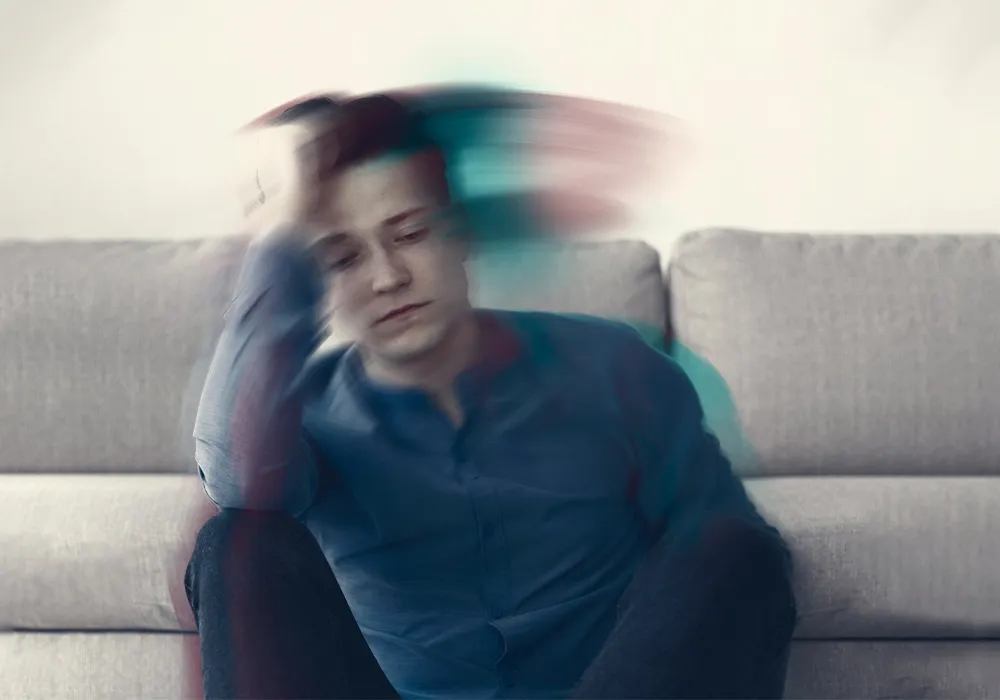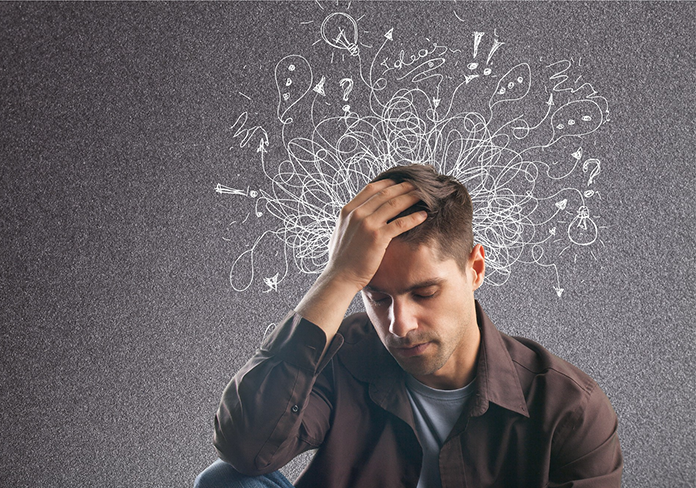What is Bipolar Disorder?
Bipolar disorders include
- Bipolar disorder type I, commonly referred to as manic depression
- Bipolar type II disorder
- Cyclothymia
Historically, we considered these mood disorders to be on a continuum with depressive disorders hence the concept of polarity, with depression at one end and mania at the other. The Mood episodes fall mainly into two groups, namely the hypomania/manic category, where the person is either in a happy, elated or irritable mood and the depressive category, where the person is constantly in a sad mood.
Bipolar Disorders can hinder the quality of life of an individual, and they must be provided with proper mental health care. With the best lady psychiatrist in Trichy in its ranks, Agan Health can offer the best mental health care for bipolar disorder.
Symptoms of hypomania in bipolar disorder:
- Persistent mild elevation of mood
- Increased energy and activity
- Marked feelings of well-being and both physical and mental efficiency.
- Increased sociability,
- Talkativeness,
- Over-familiarity,
- Increased sexual energy,
- A decreased need for sleep is often present but not to the extent that it leads to severe disruption of work or results in social rejection.
Symptoms of mania in bipolar disorder
- Mood is elevated out of keeping with the patient's circumstances and may vary from euphoria to a feeling of being in bliss.
- Elation is accompanied by increased energy resulting in overactivity.
- Pressure of speech.
- A decreased need for sleep.
- Attention cannot be sustained, and there is often marked distractibility.
- Self-esteem is often inflated with grandiose ideas and overconfidence.
- Loss of normal social inhibitions may result in behavioural problems.
Symptoms of Depressive Episodes in Bipolar Disorder
These episodes are similar to those that occur in depressive disorder.
- Sad mood
- Decrease attention and concentration
- Loss of interest in pleasurable activities
- Very slow in day-to-day activities
- Ideas of worthlessness, helplessness and hopelessness
- Increased or decreased sleep and appetite
Cyclothymic Disorder
Cyclothymic Disorder is also a milder form of bipolar disorder that has several hypomanic episodes and depressive episodes that can last for at least two years.
They may have unstable moods, many periods of depression or mild elation which are insufficient to be called hypomania or mild depressive disorder.
Symptoms of cyclothymic disorder
The frequency of mood swings in cyclothymic disorder is higher than in bipolar disorder. There may be no periods of stable mood between episodes, and periods of stable mood will last for less than two months. Depressive symptoms will last for at least two years and at least one year for children and teenagers. High and low moods will be experienced for at least half the time.
People with cyclothymic disorder tend to have extreme reactions to external events or stimuli. They can be overly happy and enthusiastic in response to a positive event, such as:
- Success at work
- A period of good weather
- Feelings created by substances, like drugs and alcohol
They can also be overly pessimistic and depressed by negative events, such as:
- A relationship setback
- Onset of winter
- Stressful situations, such as moving house
- Drastic changes in eating patterns
- Facing difficulty in sleeping at night and staying awake during the day
- Developing fatigue, which results in loss of energy
- Finding difficulty in concentrating at work
How is Bipolar Disorder Caused?
The exact cause of bipolar disorder is still unknown. However, the factors that lead to this condition in an individual include a mix of genetic and environmental or the imbalance of the chemicals in the brain.
What Triggers Bipolar Disorder
A stressful event or any particular situation can trigger bipolar disorder in an individual. Impactful life-changing events can cause episodes of depression in that individual. The stressful events that are most likely to cause bipolar disorder may include:
- A relationship breakdown
- Physical, mental or emotional abuse
- The death of a close member or a loved one.
Other triggers may include:
- A physical illness
- Sleep disturbances
- Constant problems in everyday life.
Sometimes the chemical imbalance in the brain can also lead to an effect. Certain chemicals in the brain called neurotransmitters, noradrenaline, serotonin and dopamine help in the proper functioning of the brain. However, if there is an imbalance in one of these transmitters, it can increase the risks of bipolar disorder.
It is possible to treat bipolar disorders, and you must get the best care possible. The leading lady psychiatrist in Trichy can help provide you with the best treatment for bipolar disorders.
Bipolar disorders in children and adolescents
It is easy to misdiagnose mania in adolescents as a conduct disorder, antisocial personality disorder, or schizophrenia. Symptoms of mania in adolescents may include psychosis, suicide attempts, academic problems, philosophical brooding, OCD symptoms, multiple somatic complaints, marked irritability resulting in fights, and other antisocial behaviours. Although we can see many of these symptoms in healthy adolescents, severe or persistent symptoms should cause clinicians to consider bipolar 1 disorder in the differential diagnosis.
Symptoms of Bipolar Disorders
Though Bipolar Disorder often occurs in young adults, we cannot strike out the fact that it cannot affect children. In children, if bipolar disorder is not treated on time, it can worsen once they grow up.
In Children
The common symptoms of bipolar disorder in children are
- Serious mood swings that occur often and may last for a long time.
- Children are very hyperactive, impulsive or aggressive, which will impact their social life.
- Racing thoughts, which makes them change the topic of conversation constantly.
- Showing risky and reckless behaviours that are out of their character.
In between the episodes, the children may continue to be angry or dysphoric. It is rare for children to express grandiose thoughts or euphoric moods. Most part they are intensely emotional with a fluctuating but overriding negative mood.
In Adults
The symptoms of bipolar disorder in adults have two parts - Manic Episodes and Depressive Episodes.
Manic Episode
In a person suffering from a Manic Episode, the symptoms include:
- They feel very high, elated, irritable or touchy
- They are very jumpy and unusually active
- They have a decreased need for sleep
- They talk rapidly and tend to change the topics amidst the conversation.
- Their mind is filled with uncontrollable thoughts.
- They develop an excessive appetite and need for food, sex or other pleasurable activities.
- They tend to develop a feeling that they are important, highly talented and powerful.
Depressive Episode
The symptoms seen in a person suffering from a Depressive Episode include:
- They always feel sad and anxious.
- They feel like they are slower than others, which amplifies the condition.
- They face a lot of trouble when they try to fall asleep during the night or stay awake during the day.
- When they talk, they usually speak very slowly and always feel that they have nothing much to say.
- They face a lot of trouble during the time of decision-making.
- Lack of self-confidence makes them unable to make decisions.
- Lose interest in doing all the activities, even the ones that they liked doing previously.
They start feeling hopeless and worthless and develop a constant feeling of committing suicide.
How is it Treated?
To start treatment for bipolar disorder in either children or adults, you need to refer a specialised lady psychiatrist in Trichy. The mania and bipolar disorder treatment process usually includes:
- Identifying or diagnosing the disorder
- Screening for manic or depressive episodes
- Provide a personalised and accurate treatment procedure, therapy or medication
- Conducting counselling sessions that will complement their progress.
Medically reviewed by Dr Sunitha MBBS, DPM (NIMHANS), DNB
Dr Sunitha serves as the Chief Psychiatrist at Agan Health Trichy. She specialises in Adult Psychiatry, and her fields of interest include consultation liaison psychiatry and women's mental health. With over 15 years of experience in the field of mental healthcare, Dr Sunitha has been instrumental in positively transforming the lives of many in Tamil Nadu. She is also a consulting psychiatrist at some of the reputed mental health institutions in Tamil Nadu.

 Mood & Emotions
Mood & Emotions
 Anxiety &
Stress
Anxiety &
Stress
 Trauma & Abuse
Trauma & Abuse
 Children &
Adolescents
Children &
Adolescents
 Addictions &
Habits
Addictions &
Habits
 Self-Harm &
Suicide
Self-Harm &
Suicide
 Relationships & Family
Relationships & Family
 Body Image &
Eating
Body Image &
Eating
 Gender &
Identity
Gender &
Identity
 Sleep Disorder
Sleep Disorder















 Bengaluru
Bengaluru